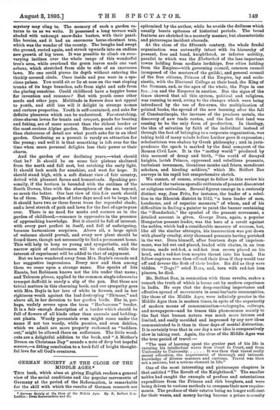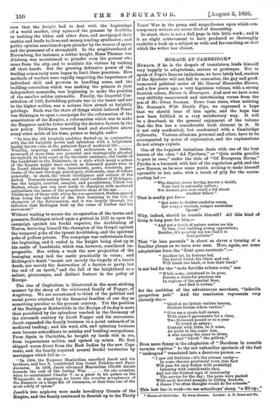GERMAN SOCIETY AT THE CLOSE OF THE MIDDLE AGES.*
THIS book, which aims at giving English readers a general view of the social conditions and the popular movements of Germany at the period of the Reformation, is remarkable for the skill with which the results of German research are • German &Vigil at the Close of the 31 td lle Ages. By B. Belfort Bx. Lotidon : Swan Bonnensehein and Co.
epitomised by the author, while he avoids the dullness which usually besets epitomes of historical periods. The broad features are sketched in a masterly manner, but characteristic and picturesque incident abounds.
At the close of the fifteenth century, the whole feudal organisation was outwardly intact with its hierarchy of peasant, free and bond, knighthood, or inferior nobility, parallel to which was the Ehrbarkeit of the less important towns holding from mediate lordships, free cities holding from the Empire--with governing council, common council (composed of the masters of the guilds), and general council of the free citizens, Princes of the Empire, lay and eccle- siastic, with the Electoral College at their head, the King of the Romans, and, as the apex of the whole, the Pope in one fun ionand the Emperor in another. But the signs of the times showed that all this system, political and religious, was running to seed, owing to the changes which were being introduced by the use of fire-arms, the multiplication of printed books, the spread of the new learning after the fall of Constantinople, the increase of the precious metals, the discovery of new trade routes, and the fact that land was ceasing to be the only form of production. In theology, the idea of salvation by faith of the individual instead of through the fact of belonging to a corporate organisation, was taking hold of many minds before Luther gave it expression ; scholasticism was shaken by Greek philosophy ; and in juris- prudence the epoch is marked by the final conquest of the Roman Civil Law. It is the " motley world" produced by this moment of decay and birth, "the world of decayed knights, lavish Princes, oppressed and rebellions peasants, turbulent townsmen, licentious monks and friars, mendicant scholars, and hireling soldiers," which Mr. Belfort Bar surveys in his rapid but comprehensive sketch.
We cannot, of course, attempt to follow in this review his account of the various sporadic outbursts of peasant discontent or religious revivalism. Several figures emerge in a curiously distinct way, Joss Fritz, for instance, the leader of a rebel- lion in the Rhenish district in 1512, "a born leader of men, handsome, and of superior manners," of whom, and of his difficulties in finding a painter to paint the banner containing the "Bundschuh," the symbol of the peasant movement, a detailed account is given. George Doza, again, a popular Hungarian peasant leader, was the hero of a revolt against the nobles, which had a considerable measure of success, but, like all the similar attempts, his insurrection was put down with ghastly cruelty, sixty thousand peasants having perished in the war. Doza himself, after fourteen days of imprison- ment, was led out and placed, loaded with chains, in an iron throne, made red-hot, a red-hot iron crown placed on his head, and a red-hot iron sceptre thrust into his hand. His fellow-captives were then offered their lives if they would tear off and devour the flesh of their leader. Six did as they were bidden. "Dogs!" cried DJZ3, and, torn with red-hot iron pincers, he died.
Mr. Belfort Bar, in connection with these revolts, makes a remark the truth of which is borne out by modern experience in India. He says that the deep-reaching importance and effective spread of movements in semi-barbaric communities, like those of the Middle Ages, were infinitely greater in the Middle Ages than in modern times, in spite of the superiority of modern means of communication—telegraphs, railways, and newspapers—and he traces this phenomenon mainly to the fact that human nature was much more intense and limited, and easily moulded and impressed by any new ideas communicated to it than in these days of mental distraction. It is certainly true that in our day a new idea is comparatively slow in taking root. Again, the close of the Middle Ages was the true period of travel:—
"The man of learning spent the greater part of his life in carrying his intellectual wares from Court to Court, and from University to University It was then that travel really meant education, the acquirement of thorough and intimate knowledge of diverse manners and customs. Travel was then not a pastime, but a serious element in life."
One of the most interesting and picturesque chapters is that entitled "The Revolt of the Knighthood." The smaller nobles had caught the example of profuse and ostentatious expenditure from the Princes and rich burghers, and were being driven to various methods to compass their new require- ments. The produce of their estates being no longer suflieient for their wants, and money having become a prime necessity now that the knight had to deal with the beginnings of a world market, they squeezed the peasant by doubling or trebling the tithes and other dues, and mortgaged their castles and lands to Jews and money-lending syndicates ; and public opinion sanctioned open plunder by the wearer of spurs and the possessor of a stronghold. In the neighbourhood of Nuremberg, for instance, a robber knight, Hans Thomas von Absberg, was accustomed to plunder even the poorest who came from the city, and to mutilate his victims by cutting off their hands. But the growing defensive power of the trading community soon began to limit these practices. New methods of warfare were rapidly impairing the importance of individual skill and prowess in handling arms, and the budding centralism which was making the princes de facto independent monarchs, was beginning to make the position of the smaller nobles untenable. Finally, the Imperial Con- stitution of 1495, forbidding private war to the lesser and not to the higher nobles, was a serious blow struck at knightly privilege. Such was the state of things which induced Franz von Sickingen to open a campaign for the reformation of the constitution of the Empire, a reformation which was to make the Emperor and the lower nobility the decisive factors in the new policy. Sickingen towered head and shoulders above every other noble of his time, prince or knight, and-
" In him the old knightly qualities flashed up in conjunction with the old knightly power and splendour with a brightness
hardly known even in the palmiest days of medixval life Wealthy, inspiring confidence and enthusiasm as a leader, possessed of more than one powerful and strategically situated stronghold, he held court at his favourite residence, the Castle of the Landstuhl in the Palatinate, in a style which many a prince of the Empire might have envied, as honoured guests were to be found attending on him, humourists, poets, minstrels, par- tisans of the new theology, astrologers, alchemists, men of letters generally; in short, the whole intelligence and culture of the period. Foremost among these, and chief confidant of Sickingen, was the knight, courtier, essayist, and pamphleteer, Ulrich von Hutten, whose pen was ever ready to champion with unstinted
enthusiasm the cause of the progressive ideas of the age Unlike most of those with whom he was associated, Hutton passed from being the upholder of the New Learning to the rOle of champion of the Reformation, and it was largely through his influence that Sickingen took up the cause of Luther and his movement."
Without waiting to secure the co-operation of the towns and peasants, Sickingen seized upon a pretext in 1521 to open the campaign against his feudal superior, the Archbishop of Treves, declaring himself the champion of the Gospel against the temporal yoke of the tyrant Archbishop, and, the spiritual yoke of godless priests. The campaign was unfortunate from the beginning, and it ended in the knight being shut up in his castle of Landstuhl, which was, however, considered im- pregnable. But within a week the new projectiles of the
besieging army laid the castle practically in rains; and Sickingen's death "meant not merely the tragedy of a hero's death, nor merely the destruction of a faction or party, but
the end of an epoch," and the fall of the knighthood as a salient, picturesque, and distinct feature in the polity of Europe.
The rise of Capitalism is illustrated in the most striking manner by the story of the celebrated family of Fagger, of Augsburg. We are accustomed to think of the political and
social power attained by the financial families of our day as something peculiar to the present century. Yet the position of the Barings or Rothschilds in the Europe of to-day is more than paralleled by the splendour reached in the Germany of the sixteenth century by Jacob Fugger and his successors. Jacob expanded the family business to a point unheard-of in media3val trading ; and his wool, silk, and spinning business
soon became subordinate to mining and banking occupations. From Spain to Carinthia, he bought up lands rich in ore, from impecunious nobles, and opened up mines. He first shipped wares direct from the East Indies by the new Cape route, and the family acquired several feudal territories by mortgages which fell in :—
" In 1504, the Emperor Maximilian ennobled Jacob and his brothers, and Leo X. constituted him Count Palatine and Eques Aureatv,s. In 1509, Jacob advanced Maximilian 170,000 ducats towards the cost of the Italian War On one occasion, when he entertained Charles V. as a guest in his palace on the Weinmarkt, in Augsburg, he burnt the overdue acceptances of the Emperor on a large fire of cinnamon, at that time one of the most costly of spices."
Jacob's two nephews were made hereditary Counts of the Empire, and the family continued to flourish up to the Thirty
Years' War in the pomp and magnificence upon which con- temporary writers are never tired of descanting.
In short, there is not a dull page in this little work ; and it is no slight achievement to have produced so thoroughly readable a book on a subject so wide and far-reaching as that which the writer has chosen.



































 Previous page
Previous page